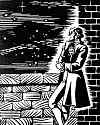|
But the
other side of his character began to assert itself - his love of
science led him to devote long hours after his musical activities to
the study of language, optics and astronomy. He couldn't find time to
read during the day so he took it from his sleep. But with all of these
things on his mind he didn't forget his favorite sister - Caroline.
He went to Hanover and brought her to England where she could study voice and keep house for him. But she did much more than this - "she became his valuable and skilled assistant in the later scientific investigations." Science groups this brother and sister together in recognizing their remarkable achievements.  Herschel inherited from his father a great love for astronomy and when
he was the conductor of a hundred piece orchestra he would often go
outside the theatre during the intermission and study the stars.
Herschel inherited from his father a great love for astronomy and when
he was the conductor of a hundred piece orchestra he would often go
outside the theatre during the intermission and study the stars. Although he longed for a telescope, he was too poor to buy one so he did the only other thing possible - he built one. After his music pupils left for the summer vacation, he turned his house into a workshop - making the tube of the telescope in the living room and grinding lenses in the bedroom. |








